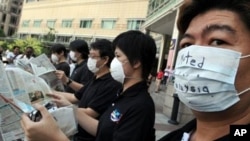Malaysia Prime Minister Najib Razak has announced plans to repeal a tough 51-year-old law allowing detention without trial and other pieces of legislation criticized by rights groups.
Najib made the announcement amid speculation he will call an early election. Under his proposals, the widely detested Emergency Ordinance and the Internal Security Act (ISA) will be abolished. The law was initially used to combat a communist insurgency and, more recently, to detain suspected terrorists.
Thousands detained
Over the past half century, thousands have been detained under the ISA. Often they were mere critics of the government while others in recent years were suspected Islamic militants.
The government will also amend publishing laws that require newspapers and other media outlets to seek a license, which must be renewed annually. Critics argue the renewal requirement stifled the media's independence.
Prominent lawyer and human rights advocate Ambiga Sreenevasan gave a mixed response to the repeals, saying their success would depend upon how quickly they are implemented.
"There were already rumors around about the repeal of the ISA and this is something they had promised a couple of years ago," he said. "But the repeal of the Emergency declaration is very significant because with that go all the preventative detention laws."
Sreenevasan said repeals of media restrictions do not go far enough, because they retain government licensing provisions.
"Instead of a yearly renewal, they're saying once the renewal is granted it stays unless revoked," he said. "The power of revocation is still there."
Public gatherings
Najib also pledged a government review of laws requiring police permission to stage public gatherings. In July, pro-electoral reform rallies in Kuala Lumpur turned violent after police declared them illegal and moved in, beating and tear gassing protesters.
Sreenevasan, also president of the Coalition for Clean and Fair Elections, was a key organizer of the rally.
"[Government officials] say they will protect freedom of assembly but not allow street demonstrations," he said. "A peaceful street demonstration is really fundamental when you talk about freedom of assembly. In my view they didn’t do anything for freedom of assembly."
Opinion polls
Public opinion polls indicate Najib's popularity has declined sharply, particularly since July's electoral reform rallies. Many believe the electoral system is biased towards the ruling Barisan Nasional coalition and its lead party, the United Malays National Organization, or UMNO.
Malaysia has also witnessed rising racial tensions and increased uncertainty over its economic outlook since the 2008 election, when UMNO was returned with a smaller majority.
That poor showing resulted in Najib ousting his predecessor and taking the top job. He now has to win back lost ground and the repeal of repressive laws is being seen as an early start to re-election campaigning.




